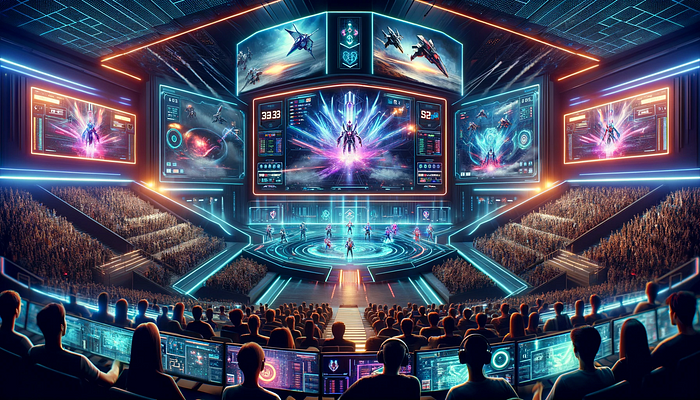Esports Goes Blockchain: The Future of Competitive On-Chain Gaming
 In the ever-evolving world of esports, a new contender has emerged, promising to revolutionize the industry: blockchain gaming. As the digital age continues to merge with the realm of competitive gaming, the introduction of on-chain games with dynamic NFTs stands to redefine the landscape of esports as we know it.
In the ever-evolving world of esports, a new contender has emerged, promising to revolutionize the industry: blockchain gaming. As the digital age continues to merge with the realm of competitive gaming, the introduction of on-chain games with dynamic NFTs stands to redefine the landscape of esports as we know it.
The Rise of Blockchain in Gaming
Blockchain technology, best known for underpinning cryptocurrencies like Bitcoin and Ethereum, has started infiltrating the gaming industry. Its decentralized nature ensures transparency and fairness, crucial factors in competitive gaming. But the real game-changer comes in the form of dynamic NFTs — digital assets that are unique, tradable, and have the potential to evolve within the game environment.
How On-Chain Games are Changing Esports
Traditional esports rely on skill and strategy within static game environments. On-chain games, however, introduce an element of unique ownership and tradeability of in-game assets. Imagine a scenario where a player’s character or equipment, represented as an NFT, evolves based on their achievements and can be traded or sold on blockchain marketplaces.
Dynamic Gameplay
The dynamic nature of these NFTs means that the game evolves continuously. As players compete, their actions don’t just earn them points or rankings; they fundamentally change the assets they own. This evolution adds a layer of strategy previously unseen in esports. Players must not only be skilled in the game but also savvy in managing their digital assets.
New Revenue Models
On-chain gaming opens up novel revenue streams for players and organizers. NFTs can be created as limited-edition items, with their scarcity driving up value. Additionally, blockchain enables more transparent and efficient ways of handling prize money and revenue sharing, ensuring fair compensation for players’ efforts and achievements.
Community and Governance
Blockchain gaming often incorporates decentralized autonomous organizations (DAOs), where players have a say in the game’s development. This community-driven approach could lead to more balanced and player-focused game evolution, a stark contrast to traditional models where developers have unilateral control.
Challenges Ahead
Despite its potential, the integration of blockchain in esports faces several challenges. The environmental impact of NFTs, scalability issues, and the need for a greater mainstream understanding of blockchain technology are significant hurdles.
The Future Landscape
As blockchain gaming continues to grow, we might see a new era in esports where digital ownership, evolving gameplay, and player empowerment are at the forefront. This paradigm shift promises a more immersive, fair, and lucrative environment for players and fans alike.
The future of esports is not just about who plays the game best; it’s about who can adapt to and excel in a world where gaming assets grow, change, and have real-world value. The line between virtual achievements and tangible rewards is blurring, and in this new world, blockchain is the key player.







![[LIVE] Engage2Earn: auspol follower rush](https://cdn.bulbapp.io/frontend/images/c1a761de-5ce9-4e9b-b5b3-dc009e60bfa8/1)































